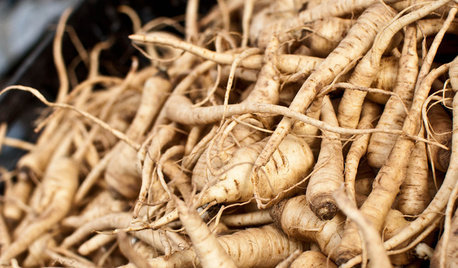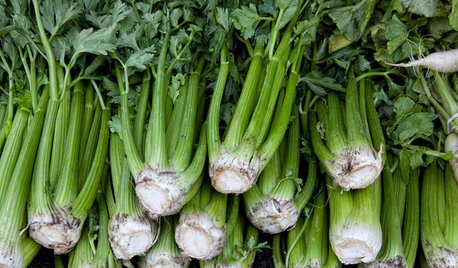Root knot nematodes
JXBrown (Sunset 24, N San Diego County)
7 years ago
Featured Answer
Sort by:Oldest
Comments (32)
Related Discussions
Root Knot Nematode (RKN), Heat Treatment, and Root Pruning
Comments (13)Oh, now that things are getting back to me; after clean-shaving all the roots and treating with bleach, I also scrubbed the root-stub with a tooth brush under running tap water... As I mentioned many times before, PREVENTION is the best cure! Do examine ALL rooted figs you get from who-ever. If RKN ever get into ones garden soil, it is extremely difficult to eradicate them, no matter how many RKN- trapping-marigolds are planted, RKN-eating-good- nematodes (expensive) are applied, or chemicals used. There is one chemical that nukes the soil (it practically kills everything!). I forgot the exact name. But it SO toxic, that it is now illegal and not available any more....See MorePossible Root Knot Nematode fix
Comments (7)Personally I have given up doing anything to the soil to control these nematodes. Whatever I have done works for a while, but the nematodes come back. Any type of organic material discourages them, so worm castings and the soil drench described above should have some effect. However, I think the effects will be rather short-lived. Maybe if you have vegetables or something that you harvest in one season it will help a lot. I try to plant perennials and there has only been a few things that have worked for me. First is to buy plants that aren't bothered by these nematodes. Most azaleas and camellias, for example, aren't bothered by them, nor are most trees. On the other hand roses and gardenias need to be grown on grafted rootstocks--although there are some roses (Louis Philippe sp?) that are resistant. The second thing that works for me is to put the plants in pots, use potting soil or amended soil and then place the pots on some type of cement or concrete. The nematodes don't like concrete. If you put the pot on the ground eventually the nematodes will reach the roots. The nematodes love sandy soils. Some people who live in areas with little sand aren't bothered by them as much, however, most of Florida sits on top of sand, so most of us need to be concerned with root knot nematodes....See MoreRoot Knot Nematodes
Comments (3)It does not look like root knot nematode damage. Usually the the root in that instance will be knarled with knot llike growth all over them. South Georgia and north Florida have lots of tomato diseases. Leaves look like Bacterial Speck, but that would not be your wilting problem. Spotted Wilt is a major problem for me. Have to use resistant varieties....See MoreHow to distinguish root knot nematodes
Comments (1)thanks for the lesson. Few people know what happens. I refer affected roots as "knobby string of pearls."...See MoreBarrie, (Central PA, zone 6a)
7 years agoJXBrown (Sunset 24, N San Diego County) thanked Barrie, (Central PA, zone 6a)JXBrown (Sunset 24, N San Diego County)
7 years agonandina
7 years agoSeysonn_ 8a-NC/HZ-7
7 years agostevie
7 years agolast modified: 7 years agogorbelly
7 years agolast modified: 7 years agogorbelly
7 years agostevie
7 years agolast modified: 7 years agodigdirt2
7 years agolast modified: 7 years agoSeysonn_ 8a-NC/HZ-7
7 years agogorbelly
7 years agoJXBrown (Sunset 24, N San Diego County)
7 years agotrickyputt
6 years agoPcolaGrower
6 years agotrickyputt
6 years agolast modified: 6 years agotrickyputt
6 years agotrickyputt
6 years agonandina
6 years agodaninthedirt (USDA 9a, HZ9, CentTX, Sunset z30, Cfa)
6 years agolast modified: 6 years agorfern
6 years agotrickyputt
6 years agolast modified: 6 years agonandina
6 years agotrickyputt
6 years agolast modified: 6 years agoplanterjeff
6 years agotrickyputt
6 years agoplanterjeff
6 years ago
Related Stories

GARDENING AND LANDSCAPINGGeometry Roots Great Garden Design
To learn why some garden designs seem particularly pleasing to the eye, look to mathematical shapes and patterns
Full Story
DECORATING GUIDESKnot Again! Macrame Is Back
It's happened. A craft that typified 1970s style (the owls, the spider plants!) is back, but better
Full Story
GARDEN STYLESNew Garden Styles Reveal Roots in Arts and Crafts Design
Landscape design from a century ago is still influencing gardens today — see if any of its features have sprung up in yours
Full Story
ROOTS OF STYLEDesign Through the Decades: The 1990s
Homes make room for tech products and task chairs, while sofas slip into something more comfortable
Full Story
RUSTIC STYLESuper Natural Design
Decorate With the Found Sculpture of Driftwood, Sticks and Roots
Full Story
ROOTS OF STYLEDesign Through the Decades: The 1930s
A monument to Art Deco sails into history, Fallingwater rises, and the Anglepoise lamp and butterfly chair take wing
Full Story
COOL-SEASON CROPSCool-Season Vegetables: How to Grow Parsnips
This unfairly maligned root vegetable is the ideal choice for a winter garden, sweetening with the frost and having a long storage life
Full Story
ROOTS OF STYLEDesign Through the Decades: The 1970s
Concern for the planet spurs a shift toward ecologically and socially responsible architecture and products
Full Story
COOL-SEASON CROPSHow to Grow Celery
If you're up for a challenge this fall, try growing celery and celeriac in your garden.
Full Story0

GARDENING GUIDES9 Low-Growing Hedges That Make Good Neighbors
Define garden areas or borders without blocking the view, with these evergreen shrubs that take kindly to trimming
Full Story


digdirt2